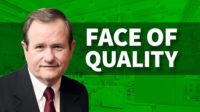Q-cast Podcast
Podcast: The Soft Skills Quality Professionals Need to Succeed

Dan Zrymiak, an ASQ Fellow and recipient of ASQ’s Feigenbaum and Crosby Medals, has almost three decades of experience in international quality and risk management. Quality sat down with Dan to share his expertise on culture, leadership and values.
Quality: You've recently worked with Quality on a series of articles, some about leadership, culture, management, kind of, sort of, the softer skills of quality, but can you tell us how did you get interested in these type of topics?
Dan: This is really what I've been encountering and the articles themselves have been derived from a series of not just my own experiences, but reflections on those experiences. In the case of a specific reference, a book called Culture Code. This is a book that was published by a debt-ridden Daniel Coyle and it was actually circulated by a former CEO. I found this to be very influential. I think this is probably where I think we can begin. Because I think it's a very good message. So to your question, really, it's having thought through a lot of this and summarizing it for my own purposes.
Quality: I think it's always great to get books and outside experiences. I just got one in the mail today. I'm excited to start reading about a whistleblower story. So with the book, what kind of impressed you the most about it? Or what do you think was kind of the big takeaway for you?
Dan: Well, the first thing was in aspects of its nature. It seemed to be either you can be a warm and fuzzy company that treats everyone well, or you can be a high-performing, successful company…In my case, it was a real shift that wasn't a question of either being a nice company that supports each other or being successful, it was that to be successful, you have to have these very good principals. I was impressed with the breadth of examples that were used by top performing organizations, not just in business, but also Navy SEALs were widely referenced. And the progression showing that first you have to build trust by having a very good culture. It was my first encounter with the term psychological safety. I could see and the example they use of either you have guard dogs or guide dogs, and you know, I love pets, I have a cat as well. Many people do have pets and see how interaction with these animals can really say a lot about life. A guard dog is defensive, protective, and often antagonistic. And you really want to keep your distance, whereas, a guide dog is something helpful and knowledgeable that helps you get to your intended destination or objective. And I think a company with more guide dogs and fewer guard dogs, that guide dog company is one that not only do you want to be around, but more will get done. The article [asks] how do we apply this for a specific quality set of quality practices?
Quality: I was going to just follow up with that. So your quality professionals who would want to improve their culture and kind of make it more of a welcoming, but also, successful kind of company, is there anything you say would be a good place to start or just a general idea to kind of guide them?
Dan: This is something that I've encountered because, in many quality companies, it's more the case that you're going to different organizations, rather than staying at the same office, same organization through the duration. My father was a teacher, then a vice principal, then a superintendent. So he really had a small number of employers. My career has not been that at all. I've had many first days on the job, either with my own employment or coming in as a consultant. When there's a lot of frequent changes, first of all, have a mentality that you are there to adapt. Do you have to be adaptable, do you have to be observant, if you build up your skills to constantly build engagement with others. A second thing is that your own personal example should be one that represents the values that you want to see, not just in others, but in the whole organization. So then that means an internal personal discipline, so that you exude those characteristics that you want to see from others. I think there's a famous quote from Gandhi. ‘Be the change you want to see.’ The personal example is, if you're a consultant representing another organization, as the representative you have to personify those values the company projects. It's also very important to adapt, be observant, and have a good personal example.
Listen to the rest of the interview below.
Listen to the Full Podcast:
Looking for a reprint of this article?
From high-res PDFs to custom plaques, order your copy today!




